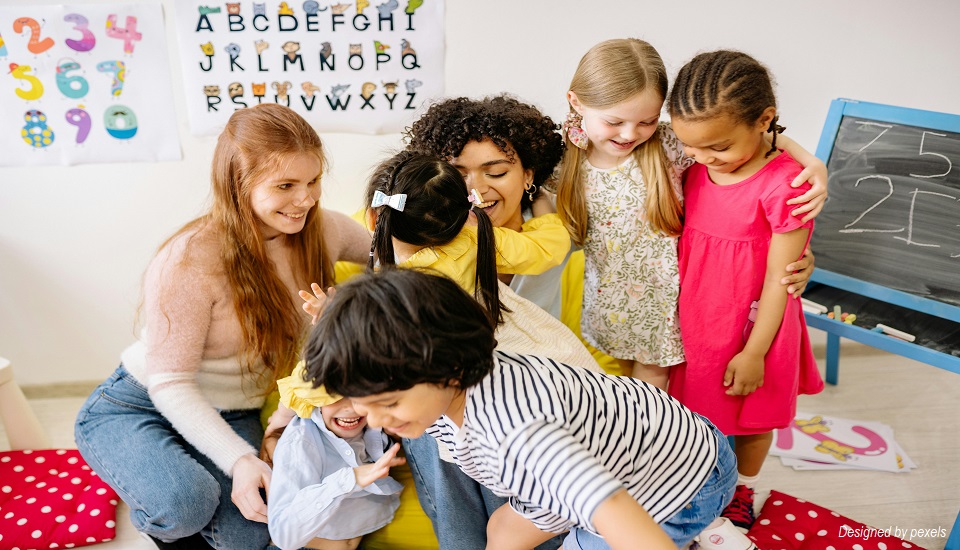With the rise in cutthroat competition in the fast-paced world of education, children are becoming more and more entangled with academic pressure. In a society that is getting faster and faster and more complicated, taking care of children's well-being and their emotional state, has been more and more important than ever. As parents, educators, and guardians, the tools and strategies we use to foster happiness in children can shape their future success and resilience.
This blog gets into the cornerstone habits that set children on a path to thriving and discusses how positive psychology and Social Emotional Learning (SEL) may change their destiny. We’ll also highlight the benefits of pursuing an Online M.Ed with Educational Psychology, which equips educators to empower children with the skills they need to lead fulfilling lives.
Why Happiness Matters in Childhood?
Happiness is not a matter of momentary joy, but it is the basis for emotional stability and achievement over the long term. Research indicates that children who are happy tend to be academically successful, socially competent, and resilient to stress. Through shaping practices that cultivate happiness, we can train children to develop a strong emotional base to endure life's challenges as well as triumphs.
The Science Behind Positive Psychology
Positive psychology is concerned with strengths, virtues, and other factors associated with human flourishing. In comparison to classic psychology, which tends to focus on the treatment of psychiatric disorders, positive psychology stresses the value of enhancing happiness, gratitude, and resilience.
Dr Martin Seligman, an innovator in positive psychology, developed the PERMA model, encompassing five primary well-being factors:
- Positive Emotion - Experiencing joy, love, and gratitude.
- Engagement - Being deeply involved in meaningful activities.
- Relationships - Building strong, supportive connections.
- Meaning - Finding purpose and significance in life.
- Accomplishment - Achieving goals and mastering skills.
When these principles are infused into a child's life, teachers and parents can create a conducive atmosphere for growth and happiness.
Habits to Teach Children to Be Happier
There are some evidence-based habits to use in promoting more happy and happy life for children:
1. Cultivating Gratitude: Gratitude has been associated with better mental health, better relationships, and a higher level of life satisfaction. Encourage children to:
- Keep a gratitude journal.
- Tell them what they appreciate during family dinners or lessons.
2. Practicing Mindfulness: Mindfulness can be used to manage stress, concentrate, and be in the now in children. Simple practices include:
- Deep breathing exercises.
- Guided meditations designed for kids.
3. Promoting Kindness: Acts of kindness promote happiness in the doer as well as the recipient. Teach children to:
- Volunteer or help others.
- Compliment friends or family members.
4. Encouraging Play and Creativity: Informal play and creative activities are useful for emotional intelligence and children's cognitive abilities. Provide opportunities for:
- Outdoor play.
- Arts and crafts, music, and imaginative storytelling.
5. Fostering Strong Relationships: Social connections are vital for happiness. Encourage children to:
- Build meaningful friendships.
- Communicate openly with family and trusted adults.
6. Teaching Goal Setting and Resilience: Help children develop a growth mindset by:
- Setting achievable goals.
- Celebrating progress rather than perfection.
- Viewing challenges as opportunities to learn.
The Role of Social Emotional Learning (SEL)
Social Emotional Learning (SEL) is an effective frame that grants the ability of children to control emotions, form positive relationships, as well as to make good decisions. SEL focuses on five core competencies:
- Self-Awareness: Children acquire the capacity to identify and conceptualize their own feelings, thoughts, and beliefs. This competency builds self-efficacy and a balanced view of their own capabilities and limitations.
- Self-Management: This involves the ability to regulate emotions, control impulses, and persevere in the face of challenges. Effective self-management helps children set goals and stay motivated.
- Social Awareness: Empathy and perspective-taking are central to this competency. Children's learning of appreciating diversity and understanding the emotions and requirements of others leads to inclusivity and cooperation.
- Relationship Skills: The skill of forming and sustaining healthy relationships is an important element of SEL. Children develop skills in active listening, effective communication, and conflict resolution, ensuring they can navigate social dynamics successfully.
- Responsible Decision-Making: This competency encourages ethical behaviour and thoughtful choices by teaching children to consider the consequences of their actions for themselves and others.
Through SEL, children acquire essential life skills that go beyond academic achievement. These competencies allow them to manage challenges, work together effectively, and make a positive contribution to society.
How an Online M.Ed with Educational Psychology Enhances SEL?
An Online M.Ed with Educational Psychology is an outstanding route for practitioners who want to enhance their knowledge of SEL and positive psychology. By combining theoretical knowledge with practical strategies, this advanced degree prepares educators to:
- Develop and implement SEL programs adapted to various learning contexts.
- Implement evidence-based interventions to promote students' emotional and social development.
- Foster a classroom culture that prioritizes well-being and inclusion.
Anyone wanting to earn this degree has the power to become an agent of change and provide children with the habits and reading skills required to live a happy and fulfilling life. Learn more about the benefits of this program here.
The Synergy of Positive Psychology and SEL
Positive psychology and SEL complement each other beautifully. Although positive psychology tends to concentrate on individual strengths and well-being, SEL offers a well-defined method to implement these concepts in an effective, reachable manner. By working together they develop an integrated strategy for mediating the development of happiness and resilience in childhood.
Real-Life Applications
Educators and parents can apply these principles in their daily lives through practical and interesting activities:
- Morning Gratitude Circle: Encourage children to engage in a gratitude-based activity at the beginning of each day and have them share something they are grateful for. This behaviour not only establishes a propitious attitude for the day but also motivates people to think about any positive experience they have.
- Mindful Minutes: Incorporate short mindfulness breaks during transitions or after recess. These might comprise guided respiration, visualization, or uncomplicated yoga postures for the purpose of refocusing and alleviating children's minds.
- Kindness Challenges: Create weekly or monthly kindness challenges, such as writing thank-you notes, helping a classmate, or picking up litter in the playground. Celebrate these acts during a dedicated time, reinforcing the value of generosity.
- Emotion Journals: Encourage children to keep a daily journal where they can write about their feelings, what went well that day, and what they might do differently. This practice builds self-awareness and emotional literacy.
- Role-Playing Scenarios: Use role-playing games to teach empathy and problem-solving. For instance, introduce a familiar problem situation and have the children go back and forth acting as various characters to investigate the solutions.
- Celebrating Achievements: Acknowledge and praise achievements, both small and significant, personally and corporately. Build a "Wall of Success" for kids where they can help one another celebrate their achievements, and offer each other great encouragement.
- Collaborative Projects: Involve children in collaborative group activities which necessitate teamwork and cooperation, for example, modelling, planning a school fair or drawing a mural. The following activities facilitate interpersonal skills and promote a community feeling.
When embedding these practices in everyday life, both teachers and parents can generate supportive contexts that allow children's emotional and social development to thrive.
To End With
Happiness is no mere biological disposition, but rather a skill that can be learned through deliberate habits and rituals. Using the resources of positive psychology and Social Emotional Learning, we can equip children with a structure for a fulfilling and strong existence. For educators, pursuing an Online M.Ed with Educational Psychology offers the tools and insights needed to make a lasting impact in children’s lives.
Help to build a brighter future for the next generation with an online M.Ed degree from East Bridge University.
Written By : Christina B.




